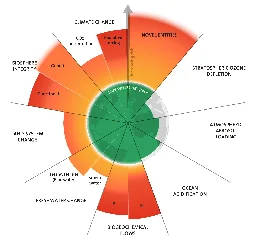science
- First cow to produce human insulin in its milk created in Brazilcosmosmagazine.com First cow to produce human insulin in its milk created in Brazil
Scientists have created a cow which can produce human insulin in its milk. The animal is transgenic – meaning DNA from another species, in this case human, was introduced into it through genetic engineering.
- Tiny sea creatures could help unravel flight MH370’s mysterious disappearance. Here’s howwww.wionews.com Tiny sea creatures could help unravel flight MH370’s mysterious disappearance. Here’s how
The mysterious disappearance of Malaysia Airlines Flight MH370 continues to baffle the aviation world, making it one of the most perplexing incidents in history. Departing from Kuala Lumpur en route to Beijing on March 8, 2014, the aircraft vanished from radar screens, carrying 239 passengers and cr...
- Birds Eat Poop A Lot, And Scientists Are Still Trying to Figure Out Whywww.sciencealert.com Birds Eat Poop A Lot, And Scientists Are Still Trying to Figure Out Why
Birds are some of the most well-researched animals in the world, and yet biologists have missed studying one of their favorite foods for too long.
- Fossil of a giant freshwater turtle found in the Brazilian Amazoncosmosmagazine.com Fossil of a giant freshwater turtle found in the Brazilian Amazon
Fossilised remains of a giant freshwater turtle which lived between 40,000 and 9,000 years ago have been found in the Brazilian Amazon.
- News reports that don't report magnitude of scientific findings could mislead the publicphys.org News reports that don't report magnitude of scientific findings could mislead the public
When media coverage doesn't include the numerical magnitude of a scientific study's effect, the risk of readers developing biases increases significantly, according to a new University of Michigan study.
- Lead from gasoline blunted the IQ of about half the U.S. population, study sayswww.nbcnews.com Lead from gasoline blunted the IQ of about half the U.S. population, study says
Leaded gas was banned in 1996, but exposure to the poison cost people born before then several IQ points on average, researchers estimated.
- ‘Monumental’ experiment suggests how life on Earth may have startedwww.pressherald.com ‘Monumental’ experiment suggests how life on Earth may have started
Scientists at the Salk Institute have taken a small but essential step in showing how RNA might have kick-started life on our planet.
- Stem cells from amniocentesis used to grow organoidscosmosmagazine.com Stem cells from amniocentesis used to grow organoids
Stem cells in the fluid from the amniotic sac could be used to grow organoids, according to researchers from the UK.
- Study finds that we could lose science if publishers go bankruptarstechnica.com Study finds that we could lose science if publishers go bankrupt
A scan of archives shows that lots of scientific papers aren't backed up.
- Brain-Imaging Experiment Reveals The Secret Behind Creative Flowwww.sciencealert.com Brain-Imaging Experiment Reveals The Secret Behind Creative Flow
Getting into 'the zone' when being creative can be tricky, even if you've been there before.
- Rethinking Earth’s Surface: Geoscientists Discover Hidden Faults of the Pacific Platescitechdaily.com Rethinking Earth’s Surface: Geoscientists Discover Hidden Faults of the Pacific Plate
Research indicates that the Pacific Plate is being torn apart at undersea plateaus across the ocean, due to the weight of the oceanic plate subducting along the Western Pacific Ring of Fire. Recent research conducted by geoscientists from the University of Toronto is refining the long-standing mode

- Octopuses Already Had The Oldest Known Sex Chromosomes 248 Million Years Agowww.iflscience.com Octopuses Already Had The Oldest Known Sex Chromosomes 248 Million Years Ago
When you’re onto a good thing, stick to it.

- Radical Plan to Stop 'Doomsday Glacier' Melting to Cost $50 Billionwww.sciencealert.com Radical Plan to Stop 'Doomsday Glacier' Melting to Cost $50 Billion
A couple feet of sea level rise may not sound like a lot.

- Satellite to ‘name and shame’ worst oil and gas methane polluterslighthouse-eco.co.za Satellite to ‘name and shame’ worst oil and gas methane polluters
A washing-machine-sized satellite is to “name and shame” the worst methane polluters in the oil and gas industry.

- Shape-Shifting Metamaterial Inspired By Octopuses Is A World Firstwww.iflscience.com Shape-Shifting Metamaterial Inspired By Octopuses Is A World First
The new material can change its shape as needed and in real-time, which may have huge implications for various industries.

- Six of nine planetary boundaries now exceededphys.org Six of nine planetary boundaries now exceeded
A new study updates the planetary boundary framework and shows human activities are increasingly impacting the planet and, thereby, increasing the risk of triggering dramatic changes in overall Earth conditions.

- Introductory post at !science@lemm.ee
Greetings fellow scientists and interested others,
In the interest of furthering this instance's /c/science, am starting this post for people to interact with.
Who are you? What's your interest?
I'm a particle astrophysicist with a strong computational background. Overspecialization seems unwise, so I do a bit of everything inside the theory-experiment-compute space.
Decentralization has some advantages so let's make a good science community here at !science@lemm.ee .
- NANOGrav hears “hum” of gravitational wave background, louder than expectedarstechnica.com NANOGrav hears “hum” of gravitational wave background, louder than expected
Exotic stars called millisecond pulsars serve as celestial metronomes.

